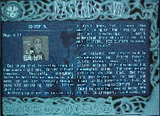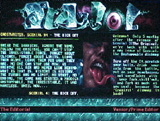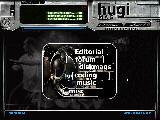Looking back on the PC Diskmags Scene
An Orientating Prophet of Hugi
The diskmag scene on the PC is undergoing very positive developments. Tons
of new mags
have been released recently: for example, OurPlace, a music e-mag with a
Visual Basic
based engine, 7Zone, a mag from the Commonwealth of Independent
Nations, of course in Russian language, and Planet, a Polish chartsmag with
an editorial in English language. In Planet, Hugi is on the 5th place. The
first four places are held by local Polish zines, in Polish language, made
by Polish
people for their fellow countrymen. So I conclude that the local diskmag
scene
is still flourishing in some countries.
 Ah, how I love writing such articles! I've done this many times, perhaps
too often. I always spread propaganda about the glory of the diskmag scene
to motivate people to write articles for Hugi and to support other mags as
well
or create new ones, simply for me to have something to read.
Someone I know recently
told me that in his opinion, we often you create things just to be able to
consume things
that are not created by anyone else. Maybe it was for this reason
that I persisted in making Hugi: I loved diskmags, but there were
only a handful, and the ones that came out more or less regularly had little
and
not overly exciting contents. I wanted to re-establish the glory of the
diskmag
scene at the time of Imphobia, or go even further: to create a magazine
culture
in the PC scene that had never been seen before. It was never on my mind
to rule the PC diskmag scene with Hugi as a monopolist; I simply wanted to
motivate other people to produce what I - and certainly others, too -
enjoyed so much: diskmags.
Ah, how I love writing such articles! I've done this many times, perhaps
too often. I always spread propaganda about the glory of the diskmag scene
to motivate people to write articles for Hugi and to support other mags as
well
or create new ones, simply for me to have something to read.
Someone I know recently
told me that in his opinion, we often you create things just to be able to
consume things
that are not created by anyone else. Maybe it was for this reason
that I persisted in making Hugi: I loved diskmags, but there were
only a handful, and the ones that came out more or less regularly had little
and
not overly exciting contents. I wanted to re-establish the glory of the
diskmag
scene at the time of Imphobia, or go even further: to create a magazine
culture
in the PC scene that had never been seen before. It was never on my mind
to rule the PC diskmag scene with Hugi as a monopolist; I simply wanted to
motivate other people to produce what I - and certainly others, too -
enjoyed so much: diskmags.
Now I have a different view on this issue. The quality of diskmags
in general has improved, especially technically, but I'm
no longer really fascinated by them. They are pervaded by constant,
monotonous topics,
such as "Is the scene dead?", OS warfares, mag-wars. Sure, there are also
mags like Shine that try to bring some new ideas into the article business,
by dealing with more interesting themes like movies and ducks, but
frankly I find that they are dealt with in a rather
trivial way. In fact I'm not really interested in movies at all.
Only an in-depth making-of of a technically outstanding movie might catch
my attention. The ducks were dealt with in a humoristic way in Shine,
which one could perhaps find entertaining if one has nothing else to do. But
still, I find
the stories in professional paper magazines more fascinating; they are both
interesting and fun to read, with the chance of learning something new.
Their quality
is simply so high that hardly any article in a diskmag can compete with
them.
 Regarding the scene, portal sites such as Orange Juice and CFXweb are now
my major source of information. They do not contain long, well written
articles, but lots of news snippets and open letters, updated daily, if not
more often. Browsing these sites once a day is more than enough
to keep me informed on what's new and hot in the scene. Especially
Orange Juice really deserves its attribute "the demoscene information
center" now, and it even has a pleasant design. Sure, you won't get all
information this way either. Some of the most interesting news can still
be derived only straight from the horse's mouth - by talking to the people.
But the news corners in diskmags have finally lost their importance due to
the recent rise in quality of the scene-related websites.
Regarding the scene, portal sites such as Orange Juice and CFXweb are now
my major source of information. They do not contain long, well written
articles, but lots of news snippets and open letters, updated daily, if not
more often. Browsing these sites once a day is more than enough
to keep me informed on what's new and hot in the scene. Especially
Orange Juice really deserves its attribute "the demoscene information
center" now, and it even has a pleasant design. Sure, you won't get all
information this way either. Some of the most interesting news can still
be derived only straight from the horse's mouth - by talking to the people.
But the news corners in diskmags have finally lost their importance due to
the recent rise in quality of the scene-related websites.
So what else should diskmags offer? Discussions are unsuitable: newsgroups
are continuously accessibile and thus easily superior to any diskmag-based
approach.
Most of the discussions held in diskmags are, in fact, regarded
as slow and stringy by the readers. As TAD put it, it's like playing chess
with three moves per month.
No news, no discussions - fine. What are diskmags for then?
Long reports about
groups, their productions, parties, and especially interesting cases (like
the Jay Newingham and the DJ Isabelle rips), where a lot of research is
required. In other words: for journalistic efforts. The advantages of
diskmags are their abundance of space and off-line access, which saves phone
costs.
Moreover, diskmags can contain tutorials with examples, in
the areas of coding, graphics, music, but also on any other subject. There
are
also good, structured and cataloged sites for these things, like
flipcode.com, which are definitely more useful if you are looking for an
answer
to a certain question.
Still, it's a nice goody to have tutorials in a diskmag, especially such
which deal with new, unprecedented matters, in other words: not something
the reader would be looking for, but something that he would be pleased with
when accidentially stumbled across accidentially. An example of such a
"goody"
is the article in Imphobia 12 about how to display
high-res black-and-white graphics in text mode by manipulating some VGA
registers. This
isn't something you'd be looking for, because there are far easier
methods to display high-res graphics. But still, this article
caught my attention, and I found it interesting and worth experimenting with
the ideas back in 1996.
 Non-scene articles would also be a really nice addition. Sure, I know
that political articles in a diskmag will never have the
quality of a commercial magazine, unless a professional journalist
happened to decide that contributing to a diskmag in his spare time would be
fun.
But still it is interesting to read other
people's opinion on topics such as genetic engeneering,
water shortages, overpopulation and the danger of China's
ambitions to become a superpower. You may say:
"Go to a newsgroup!", but this is not quite the same, because an article
in a diskmag requires (or should require) longer thinking and more
careful selection of words than posting a short thought to a forum (unless
you are experienced enough to write as spontaneously as I'm doing now and
your text still doesn't end up in a mess - okay, I should not have written
this, as certain people now have another reason to call me narcistic
*laugh*).
I'd also be interested in learning what else bothers sceners apart from
their hobby, which knowledge they have, which fears, which dreams. This
all could be covered in a diskmag, and this is what a diskmag is most
suitable for.
Non-scene articles would also be a really nice addition. Sure, I know
that political articles in a diskmag will never have the
quality of a commercial magazine, unless a professional journalist
happened to decide that contributing to a diskmag in his spare time would be
fun.
But still it is interesting to read other
people's opinion on topics such as genetic engeneering,
water shortages, overpopulation and the danger of China's
ambitions to become a superpower. You may say:
"Go to a newsgroup!", but this is not quite the same, because an article
in a diskmag requires (or should require) longer thinking and more
careful selection of words than posting a short thought to a forum (unless
you are experienced enough to write as spontaneously as I'm doing now and
your text still doesn't end up in a mess - okay, I should not have written
this, as certain people now have another reason to call me narcistic
*laugh*).
I'd also be interested in learning what else bothers sceners apart from
their hobby, which knowledge they have, which fears, which dreams. This
all could be covered in a diskmag, and this is what a diskmag is most
suitable for.
I reckon these were the most important thoughts I finally wanted to reveal
to the public
in an article.
Adok/Hugi - 13 Jun 2000
 Ah, how I love writing such articles! I've done this many times, perhaps
too often. I always spread propaganda about the glory of the diskmag scene
to motivate people to write articles for Hugi and to support other mags as
well
or create new ones, simply for me to have something to read.
Someone I know recently
told me that in his opinion, we often you create things just to be able to
consume things
that are not created by anyone else. Maybe it was for this reason
that I persisted in making Hugi: I loved diskmags, but there were
only a handful, and the ones that came out more or less regularly had little
and
not overly exciting contents. I wanted to re-establish the glory of the
diskmag
scene at the time of Imphobia, or go even further: to create a magazine
culture
in the PC scene that had never been seen before. It was never on my mind
to rule the PC diskmag scene with Hugi as a monopolist; I simply wanted to
motivate other people to produce what I - and certainly others, too -
enjoyed so much: diskmags.
Ah, how I love writing such articles! I've done this many times, perhaps
too often. I always spread propaganda about the glory of the diskmag scene
to motivate people to write articles for Hugi and to support other mags as
well
or create new ones, simply for me to have something to read.
Someone I know recently
told me that in his opinion, we often you create things just to be able to
consume things
that are not created by anyone else. Maybe it was for this reason
that I persisted in making Hugi: I loved diskmags, but there were
only a handful, and the ones that came out more or less regularly had little
and
not overly exciting contents. I wanted to re-establish the glory of the
diskmag
scene at the time of Imphobia, or go even further: to create a magazine
culture
in the PC scene that had never been seen before. It was never on my mind
to rule the PC diskmag scene with Hugi as a monopolist; I simply wanted to
motivate other people to produce what I - and certainly others, too -
enjoyed so much: diskmags.
 Regarding the scene, portal sites such as Orange Juice and CFXweb are now
my major source of information. They do not contain long, well written
articles, but lots of news snippets and open letters, updated daily, if not
more often. Browsing these sites once a day is more than enough
to keep me informed on what's new and hot in the scene. Especially
Orange Juice really deserves its attribute "the demoscene information
center" now, and it even has a pleasant design. Sure, you won't get all
information this way either. Some of the most interesting news can still
be derived only straight from the horse's mouth - by talking to the people.
But the news corners in diskmags have finally lost their importance due to
the recent rise in quality of the scene-related websites.
Regarding the scene, portal sites such as Orange Juice and CFXweb are now
my major source of information. They do not contain long, well written
articles, but lots of news snippets and open letters, updated daily, if not
more often. Browsing these sites once a day is more than enough
to keep me informed on what's new and hot in the scene. Especially
Orange Juice really deserves its attribute "the demoscene information
center" now, and it even has a pleasant design. Sure, you won't get all
information this way either. Some of the most interesting news can still
be derived only straight from the horse's mouth - by talking to the people.
But the news corners in diskmags have finally lost their importance due to
the recent rise in quality of the scene-related websites.
 Non-scene articles would also be a really nice addition. Sure, I know
that political articles in a diskmag will never have the
quality of a commercial magazine, unless a professional journalist
happened to decide that contributing to a diskmag in his spare time would be
fun.
But still it is interesting to read other
people's opinion on topics such as genetic engeneering,
water shortages, overpopulation and the danger of China's
ambitions to become a superpower. You may say:
"Go to a newsgroup!", but this is not quite the same, because an article
in a diskmag requires (or should require) longer thinking and more
careful selection of words than posting a short thought to a forum (unless
you are experienced enough to write as spontaneously as I'm doing now and
your text still doesn't end up in a mess - okay, I should not have written
this, as certain people now have another reason to call me narcistic
*laugh*).
I'd also be interested in learning what else bothers sceners apart from
their hobby, which knowledge they have, which fears, which dreams. This
all could be covered in a diskmag, and this is what a diskmag is most
suitable for.
Non-scene articles would also be a really nice addition. Sure, I know
that political articles in a diskmag will never have the
quality of a commercial magazine, unless a professional journalist
happened to decide that contributing to a diskmag in his spare time would be
fun.
But still it is interesting to read other
people's opinion on topics such as genetic engeneering,
water shortages, overpopulation and the danger of China's
ambitions to become a superpower. You may say:
"Go to a newsgroup!", but this is not quite the same, because an article
in a diskmag requires (or should require) longer thinking and more
careful selection of words than posting a short thought to a forum (unless
you are experienced enough to write as spontaneously as I'm doing now and
your text still doesn't end up in a mess - okay, I should not have written
this, as certain people now have another reason to call me narcistic
*laugh*).
I'd also be interested in learning what else bothers sceners apart from
their hobby, which knowledge they have, which fears, which dreams. This
all could be covered in a diskmag, and this is what a diskmag is most
suitable for.